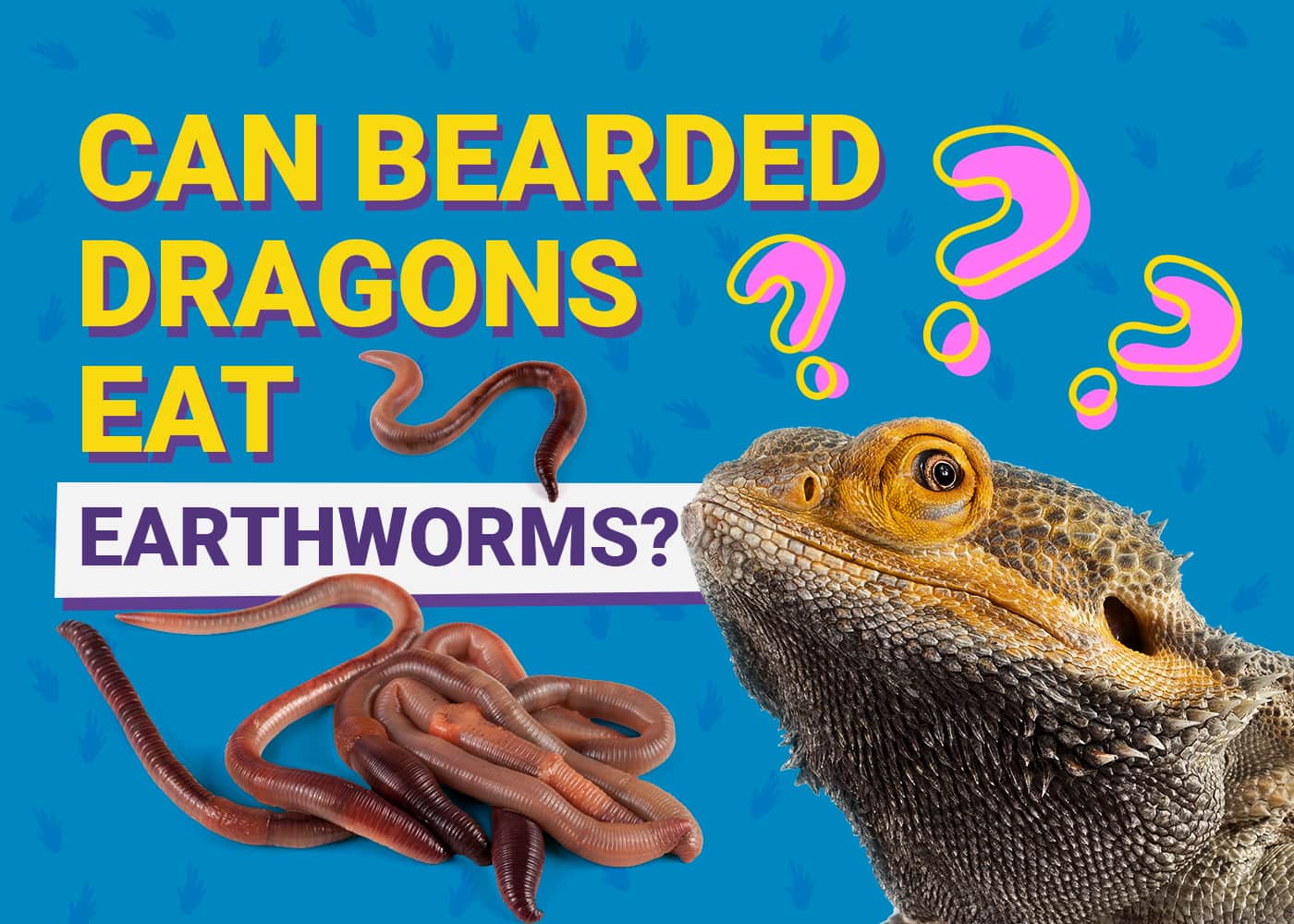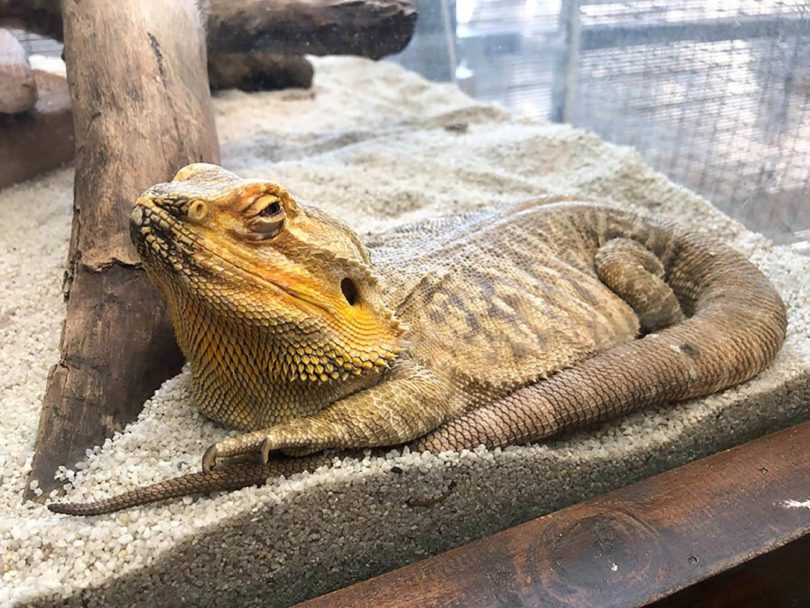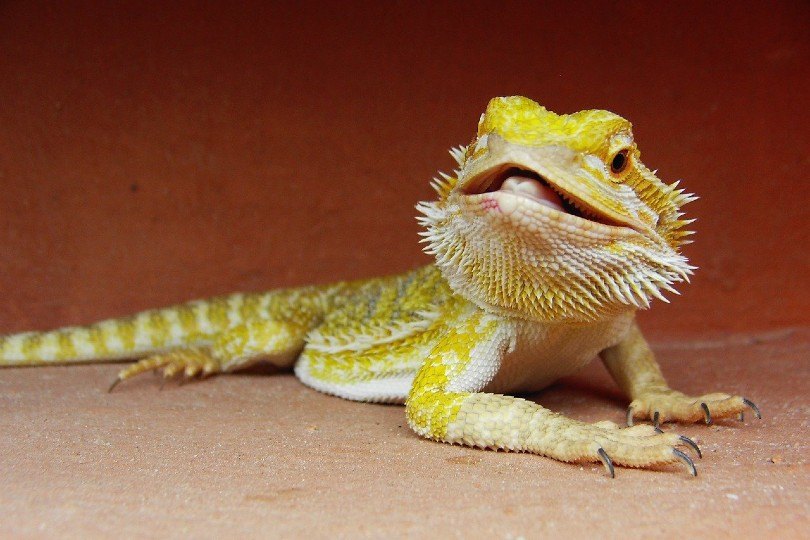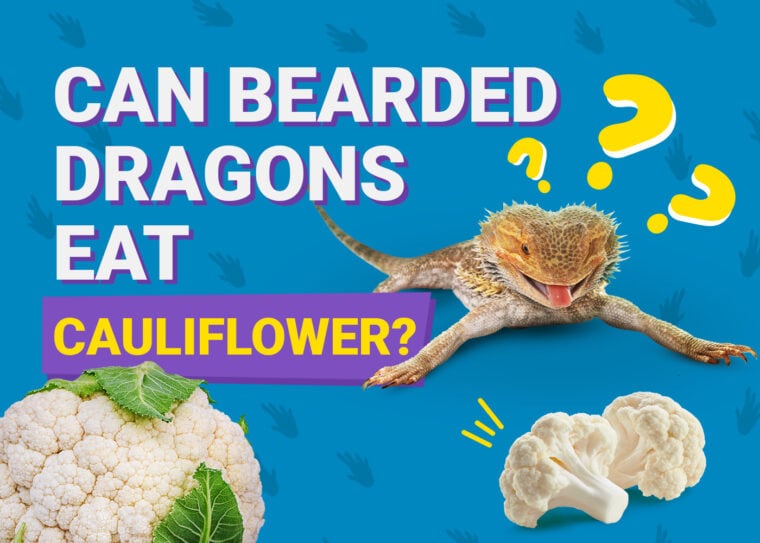
To thrive, bearded dragons need a variety of veggies. This ensures that your bearded dragon is getting plenty of different nutrients instead of just those provided by a few different foods.
When part of a balanced and varied diet, cauliflower can be safe for your bearded dragon to eat in small quantities. You don’t want your bearded dragon eating only cauliflower, of course. It doesn’t contain everything your lizard needs to live well and may be harmful when eaten in high amounts.
In this article, we’ll take a look at why you should consider feeding your bearded dragon cauliflower, as well as why you should avoid feeding them too much.
What Does Cauliflower Have in It?
Often, when choosing the veggies to feed our beardies, it can help to figure out precisely what nutritional benefits are in each one. That way, you know exactly what you’re feeding your bearded dragon and can compare it to what your bearded dragon needs.
Cauliflower contains an array of vitamins and minerals. It is exceptionally high in vitamin K and vitamin C. It also has a bit of calcium in it, which is vital for bearded dragons. You likely already give your lizard a calcium supplement to help fend off bone diseases and fractures. When your bearded dragon can get more from their veggies, it is often even better off.
All of these nutrients are important for dragons. However, your beardie can eat too much of all of them, which can cause problems. This is one reason why we recommend cauliflower only in moderation.
How Much Cauliflower Can a Bearded Dragon Have?
Cauliflower is safe to feed bearded dragons as long as they are only fed between 6-10 grams a month. This is not very much, but there are a few reasons we recommend keeping it in such a small amount.
The nutritional needs for bearded dragons are not the same as ours. It is often easy to think that healthy foods must also be a good option for bearded dragons. However, it is essential to note that bearded dragons need different vitamins and mineral amounts. Also, they are minimal. While 6-10 grams of cauliflower is not a lot to us, it is a lot to them.
If bearded dragons eat too much cauliflower, they may end up with the wrong ratio of nutrients in their diet, leading to all sorts of health problems.
While cauliflower can be given to bearded dragons in small amounts, there are healthier alternatives out there. For example, dandelion greens are a healthy option for your bearded dragon and can be given in higher amounts than cauliflower.
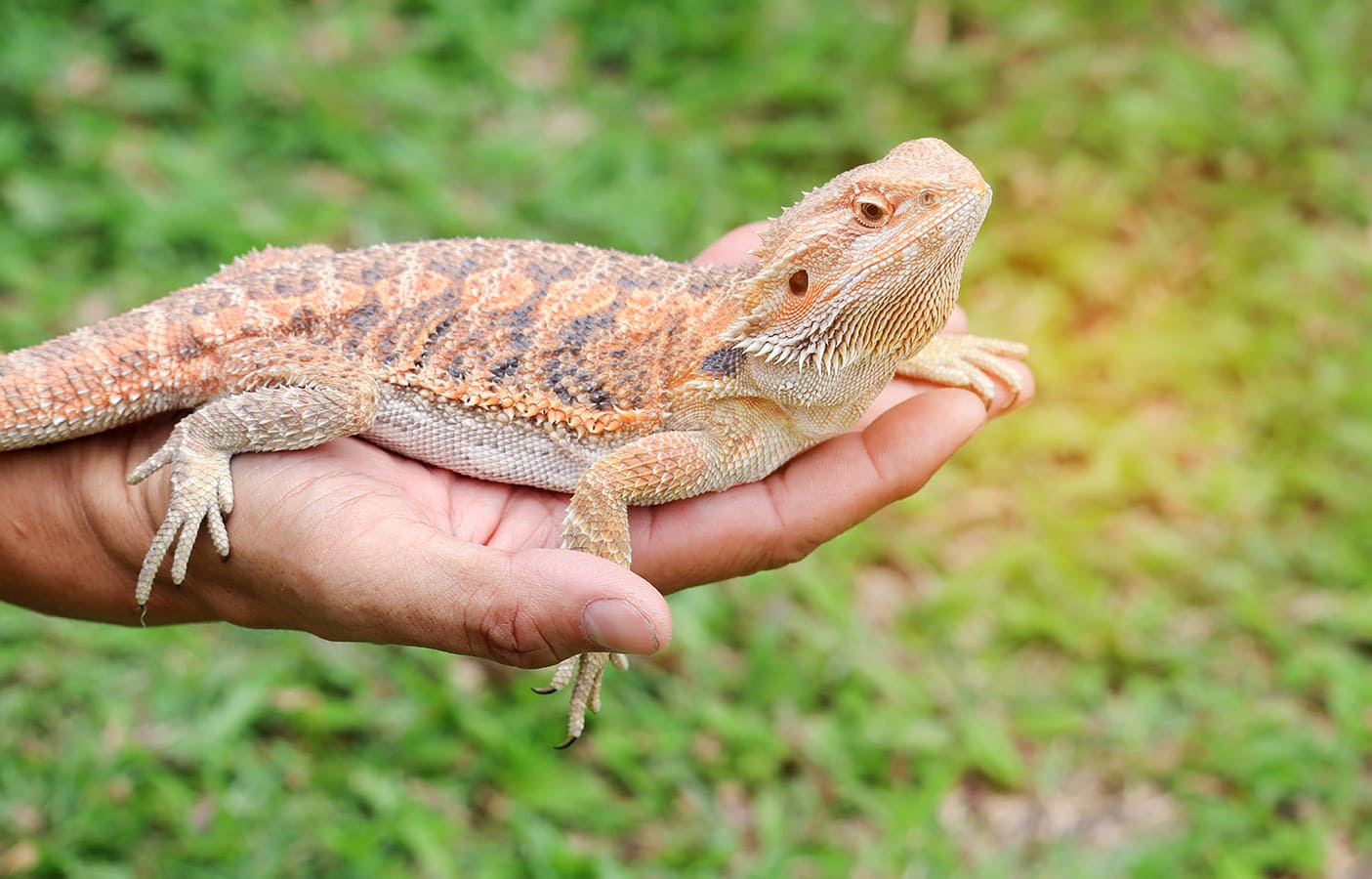
Can Baby Bearded Dragons Eat Cauliflower?
Baby bearded dragons are even smaller than adults and often have different nutritional needs. Because they are growing, they need different vitamins and minerals to grow strong.
While you can technically feed your baby bearded dragon cauliflower, we don’t recommend it. Cauliflower is lower in calcium than other veggies. Baby beardies need a lot of calcium, as their bones are growing. We recommend opting for high-calcium options when choosing veggies for] your baby bearded dragon.
Furthermore, baby bearded dragons have relatively small stomachs, which means they don’t have much room for things that aren’t nutrient-dense. While you may find a place for cauliflower in an adult’s diet and still have time for plenty of better options, this isn’t the case with juvenile bearded dragons.
Instead, consider feeding your bearded dragon dandelion greens and mustard greens. These are two veggies that are relatively high in calcium.
Can Bearded Dragons Eat Cauliflower Greens?
Surprisingly, the leaves of cauliflower are much healthier for your dragon than the cauliflower itself. Cauliflower leaves do not contain the same ratio of nutrients as the head of the cauliflower. It has an entirely different makeup, which happens to be better for your bearded dragon.
Cauliflower greens are higher in calcium and lower in phosphorus than the actual cauliflower head. This is a better choice for our bearded dragon, as our dragons need plenty of calcium to avoid metabolic bone disease (MBD).
Furthermore, the cauliflower leaves are much lower in goitrogens, which we will discuss more in detail shortly. This substance can affect your beardie’s thyroid function, which can lead to all sorts of problems.
If possible, we recommend feeding your bearded dragon the cauliflower leaves rather than the heads. This is perfect if you like cauliflower, as you can feed your beardie the scraps of the leaves you aren’t going to eat.
However, some cauliflower leaves may contain pesticides, depending on how they are grown. This can be a problem for bearded dragons, mostly because they are so much smaller than us. Just a little bit of pesticides can severely mess them up. Be sure to get their food from a pesticide-free source or grow them yourself.
Cauliflower leaves are also a great way to gut-load insects. They are high in calcium, which makes them similar to feeding insects calcium powder. When your beardie eats the insects, they will consume the cauliflower leaves as well.

Why Shouldn’t I Feed My Bearded Dragon Cauliflower?
There are several reasons why you may want to avoid feeding your bearded dragon cauliflower. There is a reason we only recommend it moderately, though we can see why some owners may decide not to feed it at all.
Cauliflower Is High in Goitrogens
Cauliflower is one of many veggies that are high in goitrogens. If this substance is consumed in high amounts, it has the possibility of altering your bearded dragon’s thyroid function.
Your bearded dragon’s thyroid plays a significant role in several functions. If it isn’t acting correctly, your bearded dragon’s metabolism may not work properly either, which can cause a whole host of problems. The chance of MBD is higher if your bearded dragon has impaired thyroid function.
Consuming foods that are high in goitrogens every now and then isn’t going to make much difference. The effect of this substance is minimal and will not matter in the long-run.
However, if your dragon regularly eats foods high in goitrogens, their thyroid function will always be out of whack. This is going to cause problems over the long run. Other foods that contain a high level of goitrogens include broccoli, some cabbages, and turnips. You want to avoid feeding these foods when you’re giving your dragon cauliflower as well. They need to be fed in moderation as a group.
This doesn’t mean you should never offer any of these foods listed. However, they need to be fed carefully and alongside veggies that are high in calcium.
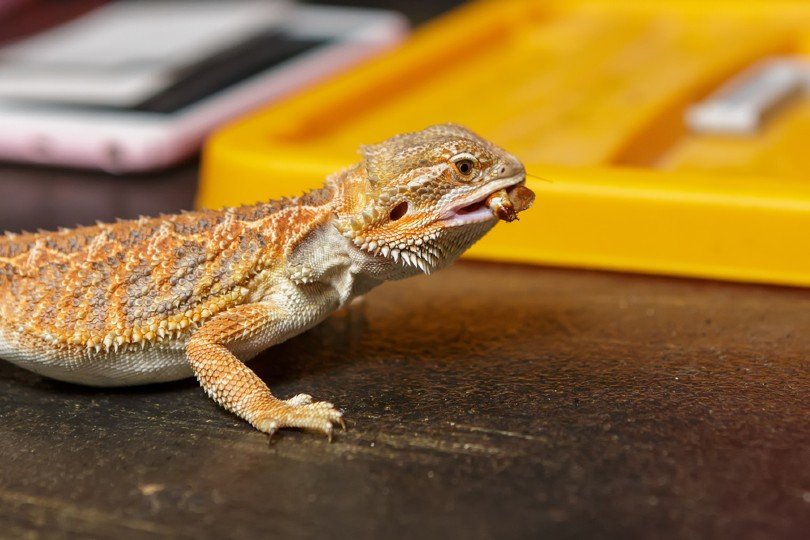
Cauliflower Has a Bad Calcium to Phosphorus Ratio
When feeding bearded dragons, many of us are merely trying to avoid MBD. This is a serious condition in bearded dragons that is not always reversible. It affects their bones and can lead to difficulty walking and even fractures.
Most people know that bearded dragons need lots of calcium to prevent this disease. However, this isn’t the whole story. The food’s calcium to phosphorus ratio is also essential. If your bearded dragon overeats phosphorus, it won’t matter how much calcium you feed them.
Phosphorus can bind to calcium, which prevents it from being absorbed and used in your bearded dragon’s body. However, your dragon does need phosphorus, so you can’t avoid it altogether.
Preferably, you want your bearded dragon’s diet to have a 2:1 ratio of calcium to phosphorus. This will allow your bearded dragon to absorb all the nutrients they need.
You want this ratio in your dragon’s whole diet, not necessarily every food you feed them. Occasionally giving your beardie food that contains an unbalanced ratio isn’t that big of a deal. However, you don’t want to do it all the time, or your bearded dragon may not absorb the nutrients they need from their food. This can lead to health problems.
In 100 g of cauliflower, you’ll also find 22 mg of calcium and 44 mg of phosphorus. This is more phosphorus than calcium, which is the opposite of what you’re looking for. Therefore, this leads to an imbalanced ratio, leading to metabolic bone disease if fed in excess.
This is another reason why we recommend cauliflower only in moderation. You don’t want to feed your dragon so much that their diet’s calcium to phosphorus ratio becomes out of whack.
Why Should You Feed Your Bearded Dragon Cauliflower?
There are also several reasons why you may want to feed cauliflower to your bearded dragon. It is a veggie that contains many nutrients, providing many of the things your dragon needs to thrive.
For instance, cauliflower is very low in fat and sugar. Your bearded dragon does not need high amounts of these two nutrients in their diet, as it can cause all sorts of problems like diarrhea, obesity, and tooth decay.
Cauliflower also contains a moderate amount of fiber. This helps your bearded dragon’s digestive tract function properly, which can help prevent diarrhea and digestive upset.
Furthermore, cauliflower also contains a lot of vitamin C and potassium. Vitamin C is essential for many body functions. It is used in the maintenance of bones and teeth. It is also used to heal wounds and repair tissues, though hopefully, your dragon won’t be needing this all that much.
Should Bearded Dragons Eat Raw or Cooked Cauliflower?
The nutritional value of cooked cauliflower is different from the nutritional value of raw cauliflower. Generally speaking, cooked cauliflower loses some of its nutritional value, especially in terms of protein, calcium, vitamin C, and potassium.
You should feed them raw cauliflower for this reason. Cut it up so that it is smaller than your dragon’s head so that they can devour it. This will prevent choking.
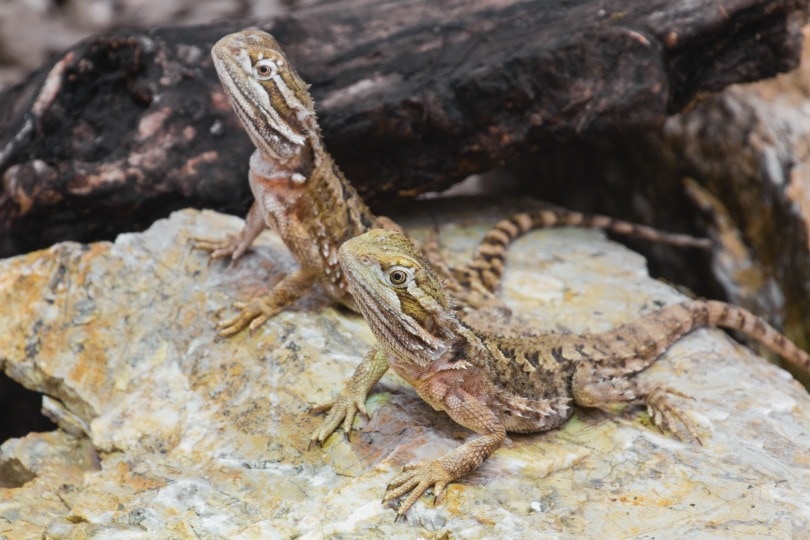
Final Thoughts
You can feed your beardie cauliflower. However, it is best fed in moderation. It is a bit too high in phosphorus for our liking. It also contains substances that can affect your lizard’s thyroid function.
Moderation is the best call in this case. It isn’t bad for your bearded dragon necessarily, but it also isn’t good either.
Featured Image: Pixaline, Pixabay


